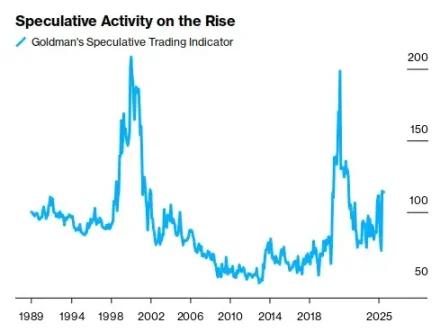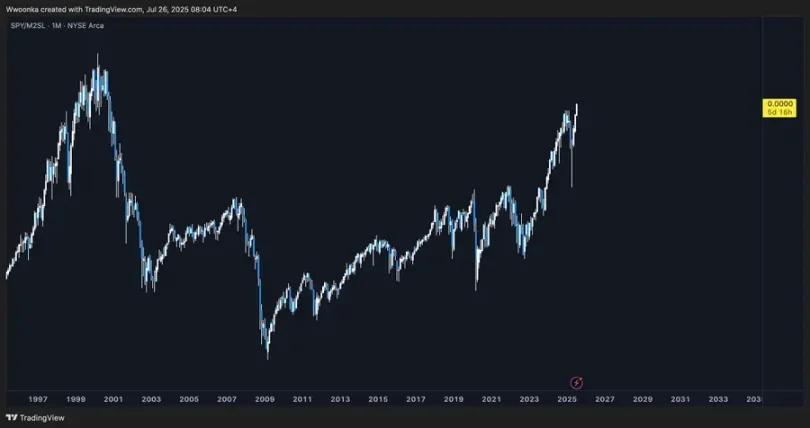Written by: arndxt, Crypto KOL
Translated by: Felix, PANews
We are currently at the end of an extremely financialized cycle.
An Altcoin can rise tenfold in a month, but may also drop 20% in a day, which would surprise CT. We are in a bubble market, but the bubble is just a surface phenomenon. The deeper issues lie in liquidity, distortion, and a civilization gradually collapsing under the weight of its own contradictions.

The S&P 500 index hits a new high, and people cheer. But taking a step back, the so-called historical high is nothing more than a liquidity illusion, measured by a currency driven by inflation with no support. Adjusted for inflation, the S&P index has made no progress since the 2000s. This is not "growth," but a chart of money supply.

Moreover, the Federal Reserve will not cut rates next week. In an optimistic scenario, it might be September, or perhaps one more cut in December if the economic situation worsens. But interest rate adjustments can no longer solve any problems. What we face is a structural issue, and only three things truly matter:
1. Slow Disintegration of the Debt System
The modern monetary order has reached its end. Built on an ever-expanding debt foundation, it now faces irresolvable internal contradictions. Old strategies (stimulus measures, bailout plans, policy shifts) all depend on a key illusion: the more debt, the higher the prosperity.
But this illusion is disintegrating. Productivity growth has stagnated. Demographic structures are at odds with this system. The working-age population base is shrinking, dependency ratios are expanding, and consumption increasingly relies on credit rather than income. This machine is aging and can no longer self-repair.
Soros's super bubble theory, often misread as market analysis, is actually a critique of epistemology—how incorrect narratives support an incorrect system. 2008 should have burst this myth. But it didn't. The COVID-19 pandemic did, at a moral cost. It proved that governments cannot protect their citizens in the most literal, biological sense. Many governments believe survival is not equal for everyone.
The result is a decline in legitimacy. Today's institutions are more like facades supported by surveillance, subsidies, and psychological warfare. The Epstein case is not an anomaly but a brief revelation of a real structure: a system where crime, governance, and capital are intertwined. The United States no longer conceals its corruption but monetizes it.
2. Intelligent Encapsulation
Discussions around Artificial General Intelligence (AGI) remain stuck in naive optimism. Most people still believe AI will be widely adopted like Excel or AWS, becoming a productivity tool monetized through subscriptions.
This is an unrealistic fantasy.
If machines gain the ability to self-improve, simulate complex systems, and design new types of weapons—biological, chemical, or informational—they will not be open-source.
Nuclear technology was not democratized. CRISPR technology cannot be used arbitrarily. Every powerful technology ultimately becomes a tool for state governance, and superintelligence is no exception.
What Sam Altman implies, and what Huang Renxun quietly conveys through synthetic biology, is not about consumer productivity but about controlling the post-human trajectory. Moderna, a transnational pharmaceutical company, is a case in point—its next products won't be sold in CVS pharmacies.
The public will not access AGI. The public will only interact with castrated AGI fragments packaged in user interfaces. The real systems will be hidden, limited, and trained to serve strategic purposes. But this won't prevent most people from having other ideas. However, beliefs cannot compete with infrastructure.
3. Time as the New Currency
Until now, money could buy comfort, safety, and social status, but not time. This is changing. With AI decoding genomes and synthetic biology accelerating, we are moving towards an era where longevity becomes an engineering advantage.
But don't mistake this for a public health revolution. Real life extension, cognitive enhancement, and embryo optimization will be extremely expensive, strictly regulated, and politically controversial. Governments are already overwhelmed by population aging. They won't encourage longevity.
Therefore, the rich will not only be wealthier but biologically different, and not metaphorically. The ability to alter the human blueprint will create a new economic class: those who can escape the death curve through biotechnology patents.
Such a future cannot be scaled, it's a path of privilege. Longevity will become the ultimate luxury, priced to serve only a few. This is why most "longevity funds" perform poorly. The return is survival, and survival cannot be scaled.
Divergent Paths: Three Civilizations Ahead
The current situation is differentiating into different tracks, each with its own political economy:
- Anesthetizing the Masses (Digital Fentanyl): AI-generated dopamine cycles, social media, virtual pornography, infinite scrolling. Over-stimulated, malnourished, politically irrelevant. This is the experience of most people. A cheap, scalable anesthesia method.
- Cognitive Tier (Biological Sublimation): A minority group enhanced both biologically and intellectually. They don't pursue economic returns but seek control over biology and death. Fewer in number, wealthier, and increasingly hard to reach.
- New Amish (Conscious Rejection): Those choosing a third exit path, disconnecting, seeking meaning outside machines, trying to preserve human experience in a world designed to erase it. Spiritually rich, strategically doomed.
The first category funds the second. The third category resists both.
Most people will "go with the flow" (blindly), barely staying afloat, unaware they've become products rather than participants. But for those who foresee the future, opting out is no longer neutral but an act of resistance.
Clear Strategy in a Broken World
The market is full of noise. Cryptocurrencies, stocks, yield games—they are optional tools, not salvation. The real game is about survival. The question is who can escape the collapse and under what conditions.
- The monetary system's design is continuously degrading.
- Superintelligence will not be your productivity assistant.
- Biotechnology will isolate time itself.
- Epstein proved that power is isolated, not accountable.
If you understand this, the issue is not how to "beat the market." It's about preparing for asymmetry in a system that no longer serves its participants.
You won't see clarity in price movements, but in systems thinking.
Most people won't look up. Most people won't believe until it's too late. Even if it costs everything. Because dying in bewilderment is worse than dying penniless.






